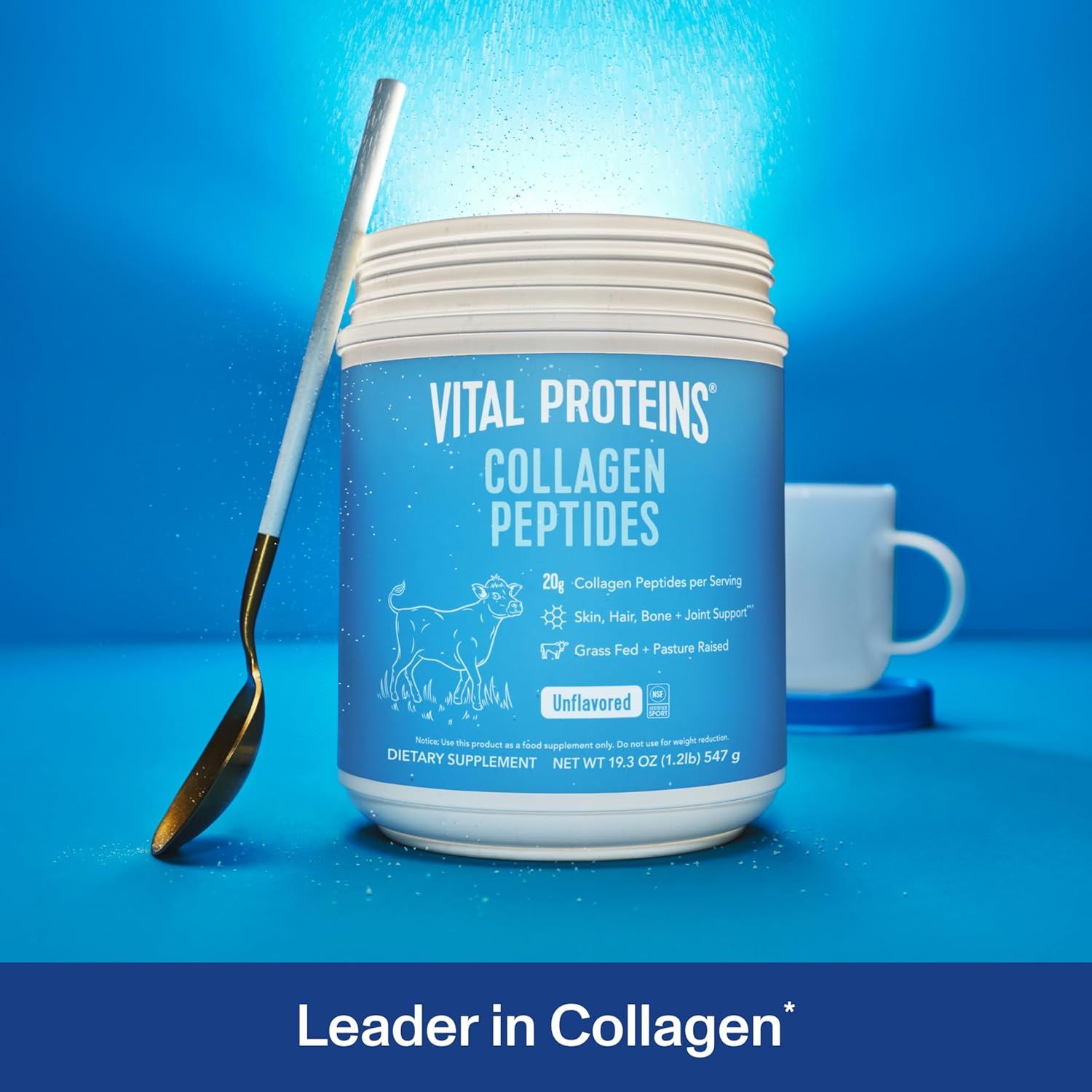Boost Muscle & Protect Joints with Collagen

Collagen supplementation is becoming increasingly popular among athletes and fitness enthusiasts, and for good reason.
Collagen is the most abundant protein in the body, found in connective tissues like skin, tendons, ligaments, and cartilage. While it’s often associated with skin health and aging, collagen plays a crucial role in muscle building and joint health as well.
Use this collagen powder daily in a shake, yogurt or mix collagen creamer in your coffee!
Here’s why collagen supplementation is particularly important for athletes and anyone looking to enhance muscle building and protect their joints:
1. Collagen for Joint Health
- Supports Cartilage Integrity: Cartilage is the tissue that cushions your joints, and it’s composed primarily of collagen. As you age or engage in intense physical activity, cartilage can wear down, leading to joint pain or injury. Collagen supplementation helps maintain cartilage structure and function, potentially reducing the risk of joint injuries.
- Reduces Joint Pain: Studies show that collagen can help reduce the symptoms of joint pain, particularly in conditions like osteoarthritis. For athletes, this means less discomfort during or after exercise and a reduced risk of developing chronic joint issues.
- Enhances Flexibility: Collagen is vital for the ligaments and tendons that connect muscles to bones and joints. It provides structure and strength to these tissues, which helps improve flexibility and range of motion. This is especially beneficial for athletes who need to maintain peak performance and avoid overuse injuries.
- Supports Ligament and Tendon Repair: In case of joint injury, collagen aids in the repair of ligaments and tendons. It helps speed up recovery, reducing downtime for athletes dealing with injuries.
2. Collagen for Muscle Building
- Improves Muscle Recovery: Collagen is rich in glycine and proline, two amino acids that play a key role in muscle repair and regeneration. Collagen supplementation helps provide the building blocks necessary for muscle recovery after intense workouts. This is particularly important for athletes who need to recover quickly and get back to training.
- Stimulates Collagen Synthesis: Collagen production in the body decreases as we age, but it’s also reduced by intense exercise. Supplementing with collagen peptides has been shown to increase the body’s production of collagen, promoting muscle repair and growth.
- Helps Prevent Muscle Loss: Collagen is a source of protein, and while it’s not as complete as whey or other proteins, it can still support muscle protein synthesis. This is particularly beneficial during periods of recovery or when an athlete is dealing with an injury that might lead to muscle atrophy.
- Improves Tendon and Ligament Strength for Better Performance: Strong tendons and ligaments are key for force transmission and muscle function. Supplementing with collagen enhances tendon and ligament strength, which in turn helps improve overall athletic performance, especially in power-based sports or activities requiring sudden explosive movements.
3. Collagen and Bone Health
- Supports Bone Structure: Collagen contributes to bone density by providing a scaffold for minerals like calcium and phosphorus. As an athlete, stronger bones reduce the risk of stress fractures or other injuries related to weak bones. Bone health is crucial for athletes, especially those involved in high-impact sports.
- Reduces the Risk of Stress Fractures: By improving bone density, collagen helps reduce the risk of stress fractures, which are common among athletes who engage in repetitive, high-impact movements.
4. Bioavailability and Collagen Types
- Hydrolyzed Collagen (Collagen Peptides): When taken as a supplement, collagen is typically hydrolyzed (broken down into smaller peptides), which makes it easier for your body to absorb. This ensures that the collagen reaches your joints, muscles, and bones in a form that your body can utilize effectively.
- Collagen Types:
- Type I Collagen: The most abundant type in the body, found in skin, tendons, and bones. Great for general recovery and improving bone health.
- Type II Collagen: Found in cartilage and joints. This type is particularly important for athletes looking to improve joint health and reduce pain.
- Type III Collagen: Often found alongside Type I collagen, supporting muscles, organs, and arteries.
5. Collagen's Role in Reducing Inflammation
- Anti-Inflammatory Effects: Chronic inflammation, particularly in the joints, can hinder recovery and performance. Collagen supplements, particularly when combined with other anti-inflammatory ingredients like turmeric or vitamin C, may help reduce inflammation and support faster healing of damaged tissues. This is especially beneficial for athletes dealing with post-training or post-surgery recovery.
How to Take Collagen for Maximum Effect
- Collagen Peptides: The most common form of collagen supplementation is hydrolyzed collagen peptides, which dissolve easily in water or shakes.
- Timing: Collagen can be taken at any time of day, but many athletes prefer to take it post-workout for recovery or before bed to support overnight repair.
- Dosage:
- The typical dose for joint health is 10g per day.
- For muscle building and recovery, a dose of 10–15g per day is recommended.
- You can also combine collagen with other recovery supplements like vitamin C to support collagen synthesis.
Conclusion
Collagen supplementation is an essential tool for athletes who want to enhance muscle building, improve joint health, and recover faster. By adding collagen to your daily regimen, you’ll not only support muscle repair and growth, but you’ll also protect your joints from the wear and tear of intense training, reduce the risk of injuries, and speed up the recovery process.

